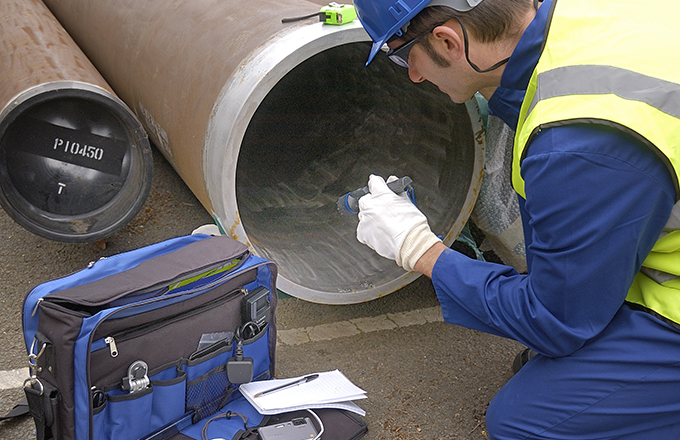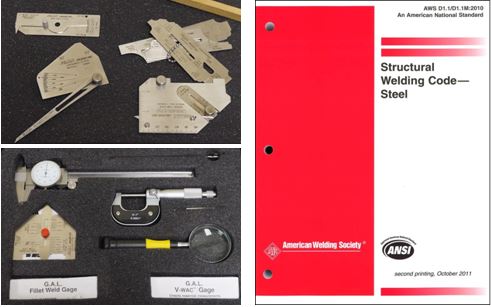Professional Welding Inspection Services in Gilbert Arizona: What You Need to Know
Professional Welding Inspection Services in Gilbert Arizona: What You Need to Know
Blog Article
The Effect of Extensive Welding Inspection on Sector Requirements: Promoting Safety, Reliability, and Conformity Across Various Sectors
The role of extensive welding evaluation is significantly acknowledged as a crucial element in enhancing industry requirements, where safety, dependability, and compliance take priority across varied sectors. What changes might we anticipate in welding approaches as the need for high quality and safety magnifies?
Relevance of Welding Evaluations
Identifying the essential role of welding inspections in preserving high quality and safety and security requirements, market experts prioritize these evaluations to make certain structural honesty. Welding evaluations function as a crucial checkpoint in the construction procedure, identifying issues that might compromise the sturdiness and safety and security of bonded frameworks. By methodically assessing welds, inspectors can discover concerns such as insufficient penetration, porosity, and cracks, which may not be visible to the naked eye.
The value of these examinations expands beyond mere compliance; they are necessary for guarding lives and shielding investments. In critical industries such as building and construction, aerospace, and production, a solitary faulty weld can bring about disastrous failures, resulting in both financial loss and human casualties. Consequently, applying strenuous evaluation protocols reduces these threats and boosts general project reliability.
Additionally, constant welding assessments cultivate a culture of high quality across organizations, encouraging welders to comply with ideal methods and maintain high criteria in their work. This dedication to top quality not just improves operational efficiency yet likewise reinforces the credibility of companies within their particular industries. Therefore, welding evaluations are important in promoting safety, dependability, and conformity throughout various markets.
Trick Sector Specifications and Rules
The framework of welding assessments is underpinned by a robust collection of market requirements and regulations that govern techniques across different fields. Secret institutions, such as the American Welding Culture (AWS) and the International Company for Standardization (ISO), develop guidelines that make sure quality and safety and security in welding procedures. For example, AWS D1.1 lays out vital needs for welding steel structures, while ISO 3834 specifies high quality demands for fusion welding.
In addition to these details criteria, industry laws like the American National Standards Institute (ANSI) and Occupational Security and Health And Wellness Administration (OSHA) mandates further boost conformity by establishing security procedures and functional best techniques. These laws are vital in industries such as production, aerospace, and construction, where welding honesty is critical.
Moreover, sector-specific criteria, such as those from the American Culture of Mechanical Designers (ASME) for pressure vessels, offer additional layers of examination to make sure that welds fulfill strict safety and performance standards. Adherence to these requirements not only helps with regulative conformity however also fosters a culture of top quality and reliability across the welding sector, ultimately securing public well-being and boosting operational performance.

Benefits of Conformity and Dependability
Consistently sticking to sector standards and laws in welding examinations yields considerable benefits, enhancing general reliability and performance. The leading advantage is the assurance of top quality in welded joints, which directly adds to the safety of structures and tools. Conformity with well established standards reduces the threat of failure and tragic incidents, thereby securing both human life and useful possessions.
Additionally, organizations that focus on extensive welding assessments foster a society of liability and professionalism and trust. This commitment not just reinforces the online reputation of the firm yet likewise imparts self-confidence in customers and stakeholders regarding the stability of product or services. Dependable welding processes lead to reduced costs linked with rework, repair work, and possible legal obligations coming from below average handiwork.
Additionally, preserving conformity with market requirements assists in smoother governing communications, as organizations can readily demonstrate adherence to necessary protocols (Welding Inspection Gilbert Arizona). This proactive approach can lead to helpful collaborations and opportunities within the market, along with access to brand-new markets
Challenges in Welding Inspection
Browsing the complexities of welding evaluation provides a myriad of obstacles that can impede compliance with sector criteria. The absence of standardized training for inspectors can result in diverse interpretations of examination standards, which might compromise security and dependability.
One more challenge hinges on the access go now of innovative inspection tools - Welding Inspection Gilbert Arizona. While modern technologies such as ultrasonic testing and radiography can enhance detection capacities, their execution might be restricted by price or availability, particularly in smaller procedures. This disparity can lead to a reliance on less effective assessment methods, boosting the threat of undiscovered flaws
In addition, the hectic nature of modern manufacturing usually pressures assessors to focus on speed over thoroughness, possibly forgeting important flaws. Governing compliance can be intimidating due to the developing nature of sector requirements, leaving companies struggling to maintain up with the most recent requirements. These difficulties demand continuous renovation in assessment practices to make sure the integrity of bonded structures throughout different fields.
Future Trends in Welding Practices
Emerging innovations and evolving approaches are readied to change welding techniques Get the facts in the coming years. Innovations in automation, such as robotic welding systems, are obtaining traction, improving accuracy and effectiveness while decreasing human error. These systems will not just accelerate production yet also assist in regular quality control, dealing with several of the difficulties dealt with in hand-operated welding.
In addition, the integration of expert system (AI) and artificial intelligence right into welding processes is poised to transform evaluation and surveillance. Real-time data analytics will certainly allow predictive maintenance, enabling positive interventions that lower downtime and rise security. Moreover, boosted fact (AR) and virtual truth (VIRTUAL REALITY) modern technologies are ending up being important in training welders, providing immersive experiences that boost skill advancement without the dangers related to standard techniques.
Sustainability is additionally a vital pattern, as sectors look for greener techniques. The adoption of green materials and approaches, together with energy-efficient equipment, will likely come to be conventional. As markets adjust to these adjustments, the emphasis will move towards higher compliance with security and ecological guidelines, making sure that welding techniques not just fulfill present criteria however likewise pave the method for a safer and more lasting future.

Final Thought
In verdict, extensive welding inspections significantly enhance industry requirements by ensuring safety, reliability, and conformity throughout different fields. As sectors continue to prioritize functional integrity, the significance of extensive evaluations will only raise, ultimately profiting businesses and society at big.
The function of rigorous welding inspection is increasingly acknowledged as a crucial component in improving market standards, where safety and security, conformity, and dependability take priority throughout varied industries. Hence, welding assessments are crucial in promoting safety and security, reliability, and conformity throughout different industries.
Trick establishments, such as the American Welding Society (AWS) and the International Organization for Standardization (ISO), establish standards that ensure top quality and safety and security in welding operations. AWS D1.1 describes essential requirements for welding steel structures, while ISO 3834 defines top quality needs for fusion welding.
In conclusion, rigorous welding inspections considerably boost sector criteria by ensuring safety, dependability, and get redirected here compliance across numerous industries.
Report this page